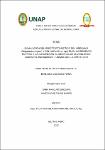Evaluación del efecto fitobiótico del orégano (Origanum vulgare) y del ajo (Allium sp.) en el incremento en peso y la conversión alimenticia de juveniles de Colossoma macropomun. Yurimaguas - Loreto 2019
Abstract
An experimental research was carried out with the purpose of evaluating the phytobiotic effect of oregano (Origanum vulgare) and garlic (Allium sp.) On the increase in weight and the feed conversion of juveniles of Colossoma macropomum, according to a completely randomized design with four treatments: control (TC:Rb), base ration with oregano (TA:Rb+O), base ration with garlic (TB:Rb+A) and the combination of both with the base ration (TAB:Rb+O+A). The research included a study population of 120 fish, distributed in twelve experimental units of 10 specimens each, with average total weights and sizes of 1.43 g and 3.7 cm, respectively. Weight gain (GP), weight increase (IP), specific growth rate (TCE), apparent feed conversion (CAA) and feed efficiency (EA), were the biological parameters that allowed to evaluate the effect of the experimental rations. According to the results, it was determined that the fish fed with the rations with additives with garlic (TB: Rb + Garlic) and with oregano (TA:Rb+O) achieved higher IP (1956.77 135.01 and 1874.94 336.70), higher TCE (3.33 and 3.30), better AAC (3.72 and 3.84) and higher EA (37.17 and 36.42), than the control fish (TC:Rb) and from the mixture of both additives (TAB:Rb+O+A) that showed less favorable data (IP = 1837.54 153.26 and 1528.51 207.75; TCE = 3.29 and 3.11; CAA = 4.37 and 4.29, and EA = 36.02 and 33.76), except in the GP, which was slightly higher in favor of control (TC:Rb) (27.06 0.46 Vs. 25.09 0.57, 26.51 1.15 and 22.81 0.80), but without these differences between the treatments being significant (p > 0.05). It is concluded that the addition of oregano and garlic can be used as an additive in food rations since they provide a moderate effect on the productive parameters in juvenile Colossoma macropomum. Se realizó una investigación de tipo experimental con el propósito de evaluar el efecto fitobiótico del orégano (Origanum vulgare) y el ajo (Allium sp.) en el incremento en peso y la conversión alimenticia de juveniles de Colossoma macropomum, según un diseño completamente aleatorizado, con cuatro tratamientos: control (TC:Rb), ración base con orégano (TA:Rb+O), ración base con ajo (TB:Rb+A) y la combinación de ambos con la ración base (TAB:Rb+O+A). La investigación incluyó una población de estudio de 120 peces, distribuidos en doce unidades experimentales de 10 ejemplares cada una, con pesos y tallas totales promedio de 1.43 g y 3.7 cm, respectivamente. Ganancia de peso (GP), incremento en peso (IP), tasa de crecimiento específico (TCE), conversión alimenticia aparente (CAA) y eficiencia alimenticia (EA), fueron los parámetros biológicos que permitieron evaluar el efecto de las raciones experimentales. De acuerdo con los resultados, se determinó que los peces alimentados con las raciones con aditivos con ajo (TB:Rb+A) y con orégano (TA:Rb+O) lograron mayor IP (1956.77 135.01 y 1874.94 336.70), mayor TCE (3.33 y 3.30), mejor CAA (3.72 y 3.84) y mayor EA (37.17 y 36.42), que los peces del control (TC:Rb) y de la mezcla de ambos aditivos (TAB:Rb+O+A) que manifestaron datos menos favorables (IP = 1837.54 153.26 y 1528.51 207.75; TCE = 3.29 y 3.11; CAA = 4.37 y 4.29, y EA = 36.02 y 33.76), excepto en la GP, que fue apenas mayor a favor del control (TC:Rb) (27.06 0.46 Vs. 25.09 0.57, 26.51 1.15 y 22.81 0.80), pero sin que estas diferencias entre los tratamientos fueran significativas (p > 0.05). Se concluye que puede utilizarse la adición de orégano y ajo como aditivo en las raciones alimenticias ya que aportan un efecto moderado en los parámetros productivos en juveniles de Colossoma macropomum.
Collections
- Tesis [145]


